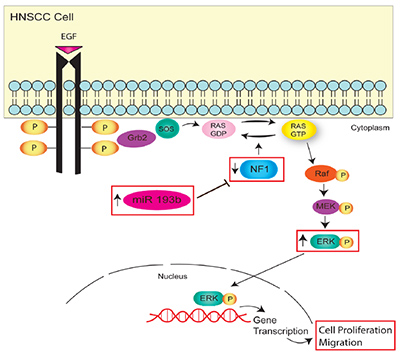Micro-RNAs
Micro-RNAs (miRNAs) are endogenous non-coding RNAs which have been associated with almost all varieties of human cancers. They are regarded as one of the largest classes of gene regulators which regulate gene expression in a sequence-specific manner. Since their initial identification in nematodes in 1993, miRNAs have been increasingly recognised as key regulators in many biological systems. Current estimates of the number of miRNAs in the human genome range from ~450 to 1000.
To understand the role of miRNAs in the development and progression of human cancers, we are currently performing global miRNA profiling of several cancers, including those originating from the head and neck (HNSCC, NPC, OPC), breast, cervical, as well as sarcomas. For the candidate cancer-associated miRNAs, the Liu lab is conducting functional characterizations to investigate the mechanisms involved in the dysregulation of these miRNAs. The goal of the Liu lab is to develop miRNA signatures with prognostic value for the aforementioned cancers. This information will also aid to improve patient diagnosis and prognosis, and development of more effective methods for therapy or prevention.

Proposed model for the role of miR-193b in regulating HNSCC cell proliferation and migration.
Representative Publications:
|